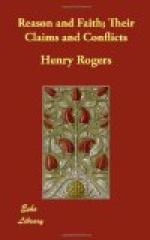As He ‘who spake as never man spake’ is pleased often to illustrate the conduct of the Father of Spirits to his intelligent offspring by a reference to the conduct which flows from the relations of the human parent to his children, so the present subject admits of similar illustration. What God does with us in that process of moral education to which we have just adverted, is exactly what every wise parent endeavours to do with his children,—though by methods, as we may well judge, proportionably less perfect. Man too instinctively, or by reflection, adapts himself to the nature of his children; and seeing that only so far as it is justly trained can they be happy, makes the harmonious and concurrent development of their reason and their faith his object; he too endeavours to teach them that without which they cannot be happy,—obedience, but a reasonable obedience He gives them, in his general procedure and conduct, sufficient proof of his superior knowledge, superior wisdom, and unchanging love; and secure in the general effect of this, he leaves them to receive by faith many things which he cannot explain to them if he would, till they get older; many things which he can only partially explain; and others which he might more perfectly explain, but will not, partly as a test of their docility and partly to invite and necessitate the healthy and energetic exercise of their reason in finding out the explanation for themselves. Confiding in the same general effect of his procedure and conduct, he does not hesitate, when the foresight of their ultimate welfare justifies it, to draw still more largely on their faith, in acts of apparent harshness and severity. Time, he knows, will show, though perhaps not till his yearning heart has ceased to beat for their welfare, that all that all he did, he did in love. He knows, too, that if his lessons are taken aright, and his children become the good and happy men he wishes them to be, they will say, as they visit his sepulchre, and recall with sorrow the once unappreciated love which animated him,—and perhaps with a sorrow, deeper still, remember the transient resentments caused by a solitary severity: ’He was indeed a friend; he corrected us not for his pleasure, but for our profit; and what we once thought was caprice or passion, we now know was love.’
These analogies afford a true, though most imperfect, representation of the moral discipline to which Supreme Wisdom is subjecting us; and as we are accustomed to despair of any child with whom parental experience and authority go for nothing, unless he can fully understand the intrinsic reasons for every special act of duty which that experience and authority dictate; as we are sure that he who has not learned to obey when young will never, when of age, know how to govern either himself or others: so a singular conduct in all the children of dust towards the Father of Spirits justifies a still more gloomy augury; inasmuch as the difference between the knowledge of man and the ignorance of a child, absolutely vanishes, in comparison with that interval which must ever subsist between the knowledge of the Eternal and the ignorance of man.




